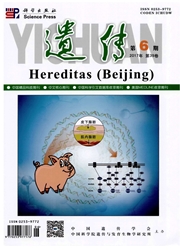

 中文摘要:
中文摘要:
Over the past years, infectious disease has caused enormous economic loss in pig industry. Among the pathogens, gram negative bacteria not only cause inflammation, but also cause different diseases and make the pigs more susceptible to virus infection. Vaccination, medication and elimination of sick pigs are major strategies of controlling disease. Genetic methods, such as selection of disease resistance in the pig, have not been widely used. Recently, the completion of the porcine whole genome sequencing has provided powerful tools to identify the genome regions that harboring genes controlling disease or immunity. Immunogenomics, which combines DNA variations, transcriptome, immune response, and QTL mapping data to illustrate the interactions between pathogen and host immune system, will be an effective genomics tool for identification of disease resistance genes in pigs. These genes will be potential targets for disease resistance in breeding programs. This paper reviewed the progress of disease resistance study in the pig focusing on Gram-negative bacilli. Major porcine Gram-negative bacilli and diseases, suggested candidate genes/pathways against porcine Gram-negative bacilli, and distributions of QTLs for immune capacity on pig chromosomes were summarized. Some tools for immunogenomics research were described. We conclude that integration of sequencing, whole genome associations, functional genomics studies, and immune response information is necessary to illustrate molecular mechanisms and key genes in disease resistance.
 英文摘要:
英文摘要:
Over the past years, infectious disease has caused enormous economic loss in pig industry. Among the pathogens, gram negative bacteria not only cause inflammation, but also cause different diseases and make the pigs more susceptible to virus infection. Vaccination, medication and elimination of sick pigs are major strategies of controlling disease. Genetic methods, such as selection of disease resistance in the pig, have not been widely used. Recently, the completion of the porcine whole genome sequencing has provided powerful tools to identify the genome regions that harboring genes controlling disease or immunity. Immunogenornics, which combines DNA variations, transcriptorne, immune response, and QTL mapping data to illustrate the interactions between pathogen and host immune system, will be an effective genomics tool for identification of disease resistance genes in pigs. These genes will be potential targets for disease resistance in breeding programs. This paper reviewed the progress of disease resistance study in the pig focusing on Gram-negative bacilli. Major porcine Gram-negative bacilli and diseases, suggested candidate genes/pathways against porcine Gram-negative bacilli, and distributions of QTLs for immune capacity on pig chromosomes were summarized. Some tools for immunogenomics research were described. We conclude that integration of sequencing, whole genome associations, functional genomics studies, and immune response information is necessary to illustrate molecular mechanisms and key genes in disease resistance.
 同期刊论文项目
同期刊论文项目
 同项目期刊论文
同项目期刊论文
 Comparison of effect of non-specific filtering methods and their combinations on GeneChip data analy
Comparison of effect of non-specific filtering methods and their combinations on GeneChip data analy Porcine S100A8 and S100A9: Molecular characterizations and crucial functions in response to Haemophi
Porcine S100A8 and S100A9: Molecular characterizations and crucial functions in response to Haemophi Systems infection biology: A compartmentalized immune network of pig spleen challenged with Haemophi
Systems infection biology: A compartmentalized immune network of pig spleen challenged with Haemophi 期刊信息
期刊信息
